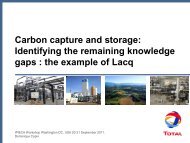addressing uncertainty in oil and natural gas industry greenhouse
addressing uncertainty in oil and natural gas industry greenhouse
addressing uncertainty in oil and natural gas industry greenhouse
You also want an ePaper? Increase the reach of your titles
YUMPU automatically turns print PDFs into web optimized ePapers that Google loves.
− Gasol<strong>in</strong>e density (average) = 0.73 g/ml (= metric tonnes/m 3 )<br />
• Petro-diesel = 130,500 Btu/gallon (36.4 MJ/liter or 42.8 GJ/t)<br />
− Petro-diesel density (average) = 0.84 g/ml (= metric tonnes/m 3 )<br />
• Metric tonne ethanol = 7.94 petroleum barrels = 1262 liters<br />
−<br />
Ethanol energy content: LHV = 11,500 Btu/lb = 75,700 Btu/gallon = 26.7 GJ/t = 21.1 MJ/liter;<br />
HHV = 84,000 Btu/gallon = 89 MJ/gallon = 23.4 MJ/liter<br />
− Ethanol density (average) = 0.79 g/ml (= metric tonnes/m 3 )<br />
• Metric tonne biodiesel = 37.8 GJ (33.3 - 35.7 MJ/liter)<br />
− Biodiesel density (average) = 0.88 g/ml (= metric tonnes/m 3 )<br />
• Metric tonne coal 5 = 27-30 GJ (bitum<strong>in</strong>ous/anthracite); 15-19 GJ (lignite/sub-bitum<strong>in</strong>ous) (the above<br />
ranges are equivalent to 11,500-13,000 Btu/lb <strong>and</strong> 6,500-8,200 Btu/lb).<br />
• Natural <strong>gas</strong>: HHV = 1027 Btu/ft 3 = 38.3 MJ/m 3 ; LHV = 930 Btu/ft 3 = 34.6 MJ/m 3<br />
• Therm (used for <strong>natural</strong> <strong>gas</strong>, methane) = 100,000 Btu (= 105.5 MJ)<br />
Carbon content of selected fuels 6<br />
• Coal (average) = 25.4 metric tonnes carbon per terajoule (TJ)<br />
−<br />
1.0 metric tonne coal = 746 kg carbon<br />
• Oil (average) = 19.9 metric tonnes carbon / TJ<br />
• 1.0 US gallon <strong>gas</strong>ol<strong>in</strong>e (0.833 Imperial gallon, 3.79 liter) = 2.42 kg carbon<br />
• 1.0 US gallon diesel/fuel <strong>oil</strong> (0.833 Imperial gallon, 3.79 liter) = 2.77 kg carbon<br />
• Natural <strong>gas</strong> (methane) = 14.4 metric tonnes carbon / TJ<br />
• 1.0 cubic meter <strong>natural</strong> <strong>gas</strong> (methane) = 0.49 kg carbon<br />
5 The energy content (heat<strong>in</strong>g value) per unit mass varies greatly between different "ranks" of coal. "Typical" coal (rank<br />
not specified) usually means bitum<strong>in</strong>ous coal, the most common fuel for power plants (27 GJ/t).<br />
6 The average carbon content values above are <strong>in</strong>dicative only. More accurate determ<strong>in</strong>ations should be sought from fuel<br />
provider, or by test<strong>in</strong>g fuels used.<br />
Pilot Version, September 2009 E-2

















